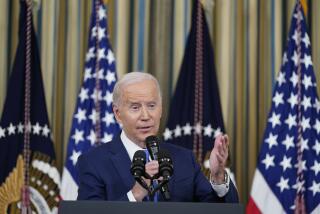Bush Plans Last-Ditch Plea on China Policy : Congress: He meets Senate Republicans today. He hopes to avert a veto override on measure protecting students.
- Share via
WASHINGTON — President Bush decided on Tuesday to make a direct, last-ditch plea for congressional support of his China policy while a leading Republican senator supporting Bush lashed out at what he called “the power of the Asia lobby” in Congress.
Bush made plans to meet face-to-face with Senate Republicans today in an effort to prevent Congress from enacting new legislation to protect Chinese students in this country from being required to return home after they complete their studies.
The President’s willingness to risk his personal prestige on the Senate vote raised the political stakes involved in the dispute over the Chinese students legislation. Bush’s scheduled appearance caused several wavering Republican senators to hold off from making any commitments or final decisions on the China bill.
In a sign of the frustration of the Bush Administration and its supporters over a possible defeat, Senate Minority Whip Alan K. Simpson (R-Wyo.) suggested Tuesday that the President’s opponents are motivated in part by their desire to raise money from Asian-Americans.
Simpson asserted at a Senate Judiciary subcommittee hearing that he believes Asian-Americans have now become the No. 1 lobby on Capitol Hill.
“With the fund-raising they do, they’re really heavy hitters,” Simpson said.
On Nov. 30, the President vetoed legislation aimed at protecting the estimated 40,000 Chinese students in this country. Administration officials worry that the legislation could prompt China to retaliate by cutting off educational and cultural exchanges with the United States.
At the time of the veto, Bush took administrative action that grants Chinese students some of the same protections contained in the legislation. Chinese students, however, have continued to press Congress for an override of Bush’s veto, arguing that the President’s administrative action could be changed or revoked at any time.
The House is scheduled to vote on the veto override today. Late Tuesday, it appeared that Bush was heading for an overwhelming defeat, with most Republicans abandoning him on the China issue.
“We want to send a very strong message to the leaders of China, and I believe a majority of Republicans in the House are going to do that,” said California Rep. Duncan Hunter (R-San Diego).
The fate of the legislation will be decided in the Senate, where a closer vote is expected. Overriding Bush’s veto requires a two-thirds vote, so the Administration will win if it can obtain the support of 34 senators. At a Republican lunch Tuesday, Secretary of State James A. Baker III urged Republicans to support the President.
Simpson’s remarks about the “Asian lobby” at the Senate hearing were aimed at countering the idea that it is merely idealism and a belief in democracy that have prompted members of Congress to support the Chinese students.
A Simpson aide later explained: “He was saying, ‘Let’s not treat these Chinese students like a bunch of helpless kids.’ They are very well organized. . . . He (Simpson) was trying to say there’s an effective Asian lobby out there.”
Simpson is the ranking Republican member of the House Judiciary subcommittee on immigration. Last year, he sought to do away with an existing provision of immigration law that grants about 54,000 immigrant visas a year to the brothers and sisters of American citizens. He was defeated when Asian-American and Latino organizations lobbied heavily to preserve the current law.
Stewart Kwoh, executive director of the Asian Pacific American Legal Center of Southern California, said Tuesday night that his organization has provided some advice to Chinese students and that another Asian-American group, the Pacific Leadership Council, has lobbied on behalf of the legislation. However, Kwoh said, most of the lobbying and organizing work has been done by Chinese students themselves.
“He (Simpson) should understand that Asian-Americans have for a long time had no voice in Washington, D.C.,” Kwoh said. “Now that Asian-Americans are making use of their democratic rights, he’s reacting in a negative way.”
More to Read
Get the L.A. Times Politics newsletter
Deeply reported insights into legislation, politics and policy from Sacramento, Washington and beyond. In your inbox twice per week.
You may occasionally receive promotional content from the Los Angeles Times.










